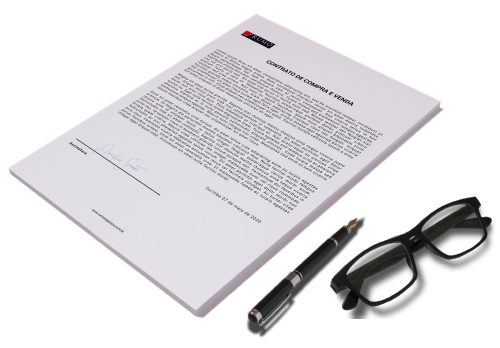“Hiring M&A specialized companies add value to the transactions for they possess strategic contacts, specific methodologies, and the experience grants better and more balanced decisions.”
Departing from quick market analyses, one can observe that the M&A market has remained highly active through periods of crisis. It is at such times that many business groups are forced to dispose of certain assets, while others, more capitalized, can benefit from such opportunities to strengthen their presence in sectors or strategically valuable regions.
M&A processes can be lengthy and complex especially from a legal and accounting point of view. For that reason, companies usually hire specialized M&A consultancy firms to facilitate the process.
We at Rumo Negócios specialize in Mergers & Acquisitions processes for Small and Medium Enterprises (SMEs). Our team is prepared to advise both Buyers (Buy-Side) and Sellers (Sell-Side), independently.
In Brazil, there is a clear upward trend in M&A transactions in the Lower Middle Market. In the past two years, we have seen a sharp activity increase in the sectors of Health, Agribusiness, Education, Energy, and Processed Foods; and the trend is that this movement will integrate other sectors such as Civil Construction and Consumer Goods in the coming years.
Our company has offices strategically located in the states of PR, SP, and SC, for we believe in human relations, and that physical presence and handshaking underpin trust, and in building a long-term relationship.
Assessoria Buy-side
We at Rumo Negócios act professionally in mergers and acquisitions processes (M&A). We advise buyers and/or investors in all stages of the business acquisition process, whether complete or partial.
Statistics show that a significant percentage of mergers or acquisitions are unsuccessful. Such outcomes occur because many transactions end up being made in an unprofessional fashion, through direct negotiations between buyer and seller, without adequate advice to prevent many of the pitfalls and variables related to the success of the transaction.
1 – Aligning objectives
Understanding the needs of the company and its stakeholder.
2 – Financial resources availability analysis
A Rumo Negócios conta com uma área especializada em Funding que pode contribuir com soluções importantes para viabilizar o processo.
3 – Profiling the target company(ies)
Understanding important aspects of the companies of interest (targets).
4 – Market Mapping
Our company holds a strategic equity interest in a Statistical Survey Company, and that grants our company an exclusive differential, where data plus knowledge equals information as a competitive advantage.
5 – Approaching the target company(ies)
Strategic and coordinated steps to avoid exposure to potential buyers, and misjudgment by the seller.
6 – Preliminary analysis of the target company(ies)
Initial analysis of the information of the target company(ies) aiming at a better understanding of whether the company fits the acquisition profile.
7 – Initial negotiations
Meetings, fact-finding visit(s), and valuation of the target company(ies.
8 – Due Diligence
The Due Diligence stage aims at further investigating the target company’s information to better assess the risks associated with the transaction.
9 – Closing
Transaction documents and sealing the deal.
10 – Post-acquisition integration
Change Management.
The Buy-side advice can be hired in its full coverage or in modules, depending on the scope of the job and the moment of negotiation.
As a Rumo Negócios customer, you shall have the peace of mind of having a team of specialists, putting all their knowledge and experience at your service and in line with your goals..
Planning to acquire a company?
Fill in the form and one of our experts will contact you.

sell-side advisory
Rumo Negócios has extensive experience in offering comprehensive and customized solutions in fundraising, mapping, and prospecting strategic partners, for the partial or the complete sale of companies.
The excessive bureaucracy and the numerous peculiarities surrounding the process of selling companies can put a lifetime of work along with your assets and reputation at risk when not properly advised by a specialized M&A firm.
We regularly work on negotiations involving shareholders, families, and professional investment entities, such as private equity funds, and for companies looking to expand through mergers and acquisitions.
We are proud to say that we have changed the “direction” of many people and organizations.
1 – Preliminary diagnosis
The Diagnosis seeks to understand the needs of the company and its shareholders. Also in assessing the degree of maturity of its financial and management controls; the needs or challenges the company currently tackles, and the shareholders’ and owners’ objectives. Additionally, we look into the reasons why the company requires more capital and which fundraising alternatives are available for companies or owners. Funding options by selling equity or raising funds (through debt), whether maintaining control or by keeping minority interest. The cash-in or cash-out approach. Financial partner or strategic partner, and so on and so forth.
Our delivery at this stage: design of the ideal process for the client according to his needs, considering the internal and the external circumstances, as well as the prevailing situation on the market at the moment of the transaction.
2 – Business Valuation
We analyze the company’s bottom lines and we structure the economic model through the application of appropriate assessment methodologies which are widely used in the M&A market. Through the use of our research and relationship with the market, we have access to information regarding transactions and multiples used in comparable transactions in different segments and regions. This allows the delivery of more up-to-date and accurate valuations, and ultimately, the presentation of a more convincing, and comprehensive picture to potential investors.
3 – Preparation of Documents for attracting investors
At this stage, the essential pieces for the presentation of the company as a viable transaction opportunity are structured. It is when the blind teaser, info memo, and other documents are formatted, and present, in a clear, precise, and persuasive manner, relevant information for potential investors.
4 – Market Mapping
Once the structural basis of the process has been completed, we then start the mapping, analysis, and preparation processes for the list of potential partners and investors. Our investor relations are broad and include the private equity sector, institutional investors, private investment companies, and private investors in Brazil and abroad. We are able to develop contacts in English, Spanish, Italian and Cantonese idioms.
5 – Approach(es)
Once mapped, we take the responsibility for the entire process of contacting and communicating with potential investors. The initial communication is made under secrecy terms and confidentiality protection until it evolves to the other stages, accompanied by the signing of specific agreements for the disclosure of more details for the transaction.
6 – Negotiation
Carrying out meetings for presentations, negotiations, technical visits, and proposals.
7 – MOU – Memorandum of Understanding
Assistance in structuring the transaction template (the backbone). We work with your legal team to design the instrument that shall start the Due Diligence process.
8 – Due Diligence
Overseeing the Due Diligence process and occasional interventions, when necessary.
9 – Closing
Transaction and closing documents. We play a fundamental role in the negotiations until the contract is finalized and signed off on.
10 – Post-acquisition integration
Change Management.
The sell-side consultancy can be hired in its full package or in modules, depending on the scope of the work and the maturity level of the company.
As a customer at Rumo Negócios, you shall have the assurance of having a team of specialists making all of their knowledge and experience available, and in line with your objectives.
Our clients rely on our vast experience to advise them when they wish to sell their companies (annual sales exceeding R$ 6 million).
Planning to sell your business?
Fill in the form and one of our experts will contact you.

Do you have any questions?
See the most frequently asked questions about Mergers and Acquisitions. If you have any questions, please contact us, we will be happy to talk to you.
Costs will depend on the scope of the contract. In the case of developing a specific project, say one module during the process, the cost will be based on billable hours/man basis (consultancy). If you hire us however, for the full package, that is, for the development of the entire negotiation process, including the valuation of the object of acquisition (Valuation), negotiation, and closing, it is likely that the price-setting will be made through the negotiation of a closed-in package, which in most cases can be even more economical than hiring by module, and which could include all the stages of the acquisition process.
This is a recurrent question in the minds of those entrepreneurs who want to sell their companies.
And that is not the only one!
There are many, actually… Ant that is because in most cases, entrepreneurs never went through a process of selling the company before. In most cases, they have a broad knowledge of their businesses, the challenges of the sector, market trends, but they never had the experience of selling a company before. Additionally, there is that insecurity atmosphere, tales of a friend of a friend who sold his company and had problems with the negotiation. With that said, it is fair to say that having doubts and insecurity is part of the process. And it is important to have them, actually.
But, that itself is obviously not enough!
So, what does it take to have my company sold?
How to know whether my company is ready to be sold?
Well, first and foremost it is decisive for the entrepreneur to research, be informed and knowledgeable of the main steps that involve the process of buying and selling companies. Subsequently, he needs to know that at a specific stage of the process, the buyer will have the right for an inspection in loco to ensure that all the information presented in the initial stages of the process is credible, and can be audited during the company’s day-to-day monitoring, as well as throughout the verification of processes and documents. Such a routine of checking back information on the spot is called Due Diligence and the buyer will not proceed with the negotiation if the result of the Due Diligence is negative.
Therefore, before starting the selling process on your own, consult with a specialist in Mergers & Acquisitions.
Companies specialized in this type of transaction usually have a multidisciplinary body, multi-skilled, and that gives a very broad view of the entire process. Depending on the situation of the company, they will indicate the best path to follow on, including whether it is really prepared to be sold. Beware though, that putting a company up for sale without preparing it to be sold can be expensive for the seller.
In Brazil, most unsuccessful sales operations are attributed to the lack of knowledge by the buyer (or seller) about the sales process. Before putting your company up for sale, contact an expert.
The answer to the question can be quite broad, as it will depend a lot on what you know and how extensive is your knowledge about the process of buying and selling companies.
In Brazil, most unsuccessful sales operations are attributed to the lack of knowledge (about the process) on the part of the buyer or the seller. That is, many transactions end up being done in an unprofessional way, through direct negotiations between buyer and seller, without the adequate knowledge to take into account the many pitfalls and important variables for the success of the transaction.
Unlike the purchase and sale of tangible assets such as automobiles, real estate, machinery, and equipment, the purchase and sale of companies is usually much more complex, involving a series of risks, both for the buyer and the seller. When selling a company, relying on specialized advice to guide and support you on all the steps involved in the process is paramount.
Many negotiations do not reach successful fruition because they begin in the wrong manner, without specialized advice, with the overvaluation (unrealistic) appointed by the seller or otherwise, unfair depreciation imposed by the buyer. In such cases, the negotiation does not evolve and what could be a real business opportunity ends up in disagreements, without any evolution, and with loss of time and money. To avoid problems such as these, Valuation ends up being an important tool to enable the entrepreneur to base decisions on technical grounds throughout the negotiation process.
Valuation is a technical and academic work that aims at rationally calculating an acceptable value range for a company’s business process. There are several methods that can be used to calculate a company’s value. The choice of the most appropriate method is a fundamental role of the M&A specialist, as his experience and daily handling of other transactions indeed contribute substantially to the setting of the correct value range, as a fundamental element for the success of the negotiation.
There are several methods that can be used to determine the value of a company, so it is important to rely on the experience of those who have already performed hundreds of evaluations of different sizes and segments and own the appropriate knowledge to recommend the best and most reliable method for each type of situation.
The NDA – The non-disclosure agreement. It is a type of legally binding contract that establishes a confidentiality relationship between parties A and B and which details that any sensitive information made available from one party to the other, shall not be leaked out to third parties.
In Brazil, the NDA is also known as The Confidentiality Agreement (CA), and it is commonly used by companies in negotiations with other companies. It allows parties to share confidential information without worrying it may fall into the competitor’s hands. As such, an NDA establishes the confidentiality relationship between two or more parties and protects the information they share from being disclosed to third parties.
















